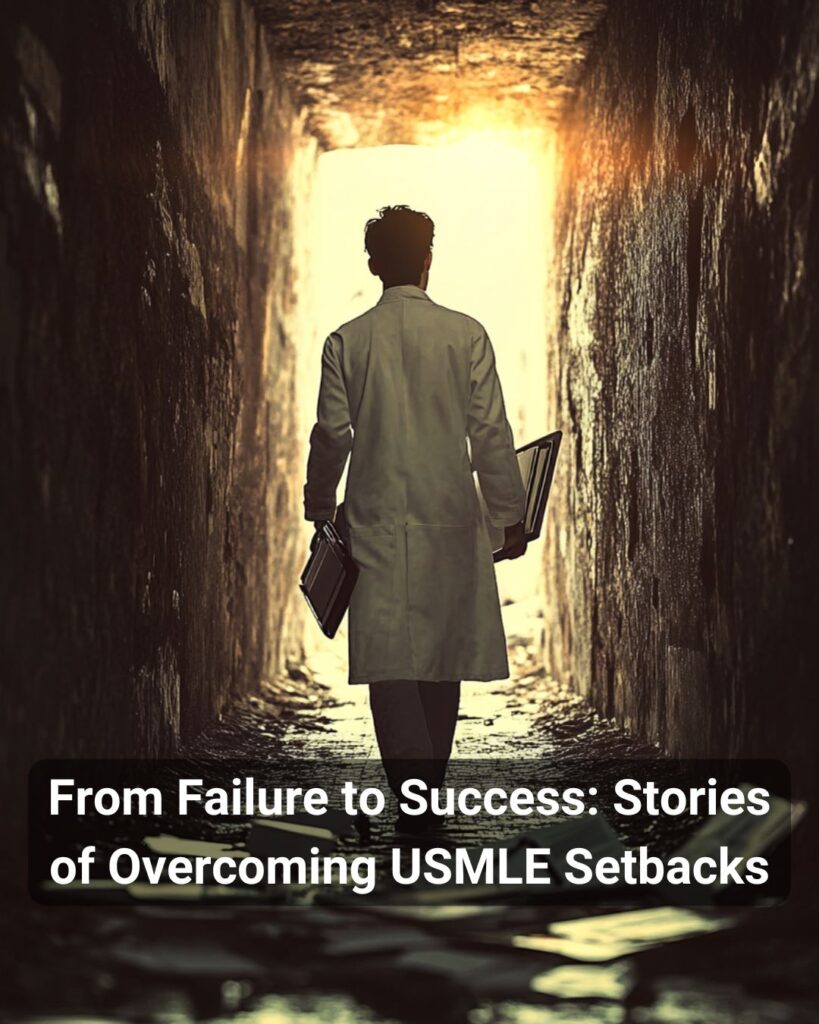From Failure to Success: Stories of Overcoming USMLE Setbacks

It’s Monday morning. You sit up, bleary-eyed, and reach for your phone. Before you’ve even had a sip of coffee, you’re scrolling. Your old classmate posted about their new puppy, and someone else lost theirs.
Sound familiar? It’s like this avalanche of personal updates hits us every day, and without even realizing it, we’re caught up in it. The pressure is constant, especially for medical students like you, already balancing rotations, USMLE prep, and trying to maintain some semblance of a life.
Dr. Sarah Khan’s Story: A Journey from Failure to Triumph
Dr. Sarah Khan’s journey with the USMLE began with a setback when she failed Step 1 on her first attempt. Like many students, she initially felt discouraged and began to doubt her abilities. The pressure to succeed weighed heavily on her, but she didn’t let the failure define her future. Instead, she sought support from mentors and colleagues who helped her regain her confidence and develop a new approach to studying.
Sarah restructured her study plan, focusing on high-yield resources and methods that worked best for her learning style. She put in the time and effort to truly understand the material instead of simply memorizing it. On her second attempt, Sarah passed Step 1 and went on to excel in both Steps 2 and 3. Ultimately, she matched into her top-choice residency program, proving that failure can be a stepping stone to success. [1]
David’s Story: Turning Failure into Opportunity
David, like Sarah, also faced failure during his USMLE journey. After failing the exam on his first attempt, he took a step back to analyze his study habits. He realized that one of his biggest weaknesses was not practicing enough under actual exam conditions. This insight was a game-changer for him.
He incorporated simulated exams into his study routine, allowing him to get accustomed to the pressure and pacing of the real test. David also made sure to focus on improving the areas where he was consistently weaker. With a better understanding of his own needs and weaknesses, he approached his second attempt with a fresh perspective and improved significantly. [3]
Anna’s Story: The Power of Preparation
Anna approached the USMLE with a different mindset—one of early preparation and careful planning. As a recent medical school graduate, Anna understood the overwhelming amount of material that needed to be mastered, so she began her preparations months in advance. She created a detailed study plan that allowed her to break the material down into manageable sections, tackling it bit by bit.
Throughout her preparation, Anna conducted regular self-assessments to track her progress and refine her strategy. Her methodical approach paid off, as she achieved a high score on her Step 1 first attempt. Her story highlights the importance of starting early and using regular self-checks to stay on track. [3]
Sarah’s Balanced Approach: Mental and Physical Health Matters
Sarah, a different student, found success through a balanced approach to her USMLE preparation. She made a conscious effort to maintain her mental and physical health while studying by incorporating stress management techniques into her daily routine. Alongside her study sessions, Sarah practiced yoga and meditation, which helped her stay focused and calm throughout her preparation.
This balanced approach ensured that Sarah not only mastered the material but also kept herself mentally and physically healthy during the process. By taking care of her well-being, she achieved excellent results on the exam. [3]
Common Themes: What Can You Learn from These Stories?
What do these stories have in common? Every student found their own way to success, but there are shared strategies that can help anyone overcome USMLE setbacks or avoid them altogether.
1. Structured Study Plans: Whether you start early like Anna or revamp your approach after a failure like Sarah and David, having a plan tailored to your learning style is key. Use active learning techniques, spaced repetition, and a variety of resources to keep things engaging and effective. [2] [4]
2. Practice Under Exam Conditions: David’s story is a prime example of how important it is to simulate the real exam. Practice tests help build endurance, reduce anxiety, and identify weak spots. Make them a regular part of your study routine. [3] [4]
3. Self-Care is Essential: Both Sarahs incorporated stress management into their routines, whether through yoga, meditation, or regular breaks. Taking care of your mind and body is crucial to sustaining long-term success. [3] [4]
4. Learn from Setbacks: Failing Step 1 isn’t the end of your journey. In fact, it can be a turning point. All three stories show that failure is an opportunity to reassess, adjust, and come back stronger. Resilience is what sets successful students apart. [1] [2] [3]
Setbacks are normal, but they don’t have to define you. Whether you’re like Sarah, David, or Anna, finding the right strategy for you is what matters.
Citations:
- [1] https://usmlepreps.com/blog/news_content/733-from-usmle-struggles-to-residency-triumph-personal-stories-of-persistence
- [2] https://usmlepreps.com/blog/news_content/718-overcoming-challenges-mastering-the-usmle-after-initial-setbacks
- [3] https://usmlepreps.com/blog/news_content/747-overcoming-usmle-challenges-success-stories-from-real-candidates
- [4] https://usmle-rx.com/conquer-step-1/
- [5] https://www.ncbi.nlm.nih.gov/pmc/articles/PMC8081295/
- [6] https://www.ama-assn.org/medical-students/usmle-step-1-2/what-i-wish-i-knew-medical-school-about-usmle-step-1-prep
- [7] https://usmle-rx.com/blog-posts/
- [8] https://www.shemd.org/post/a-match-story-of-failure-success
- [9] https://www.kevinmd.com/2019/06/how-failing-step-1-helped-me-pass-the-boards-twice.html
- [10] https://www.reddit.com/r/step1/comments/spta2u/from_failure_and_devastation_to_success_and_relief/
